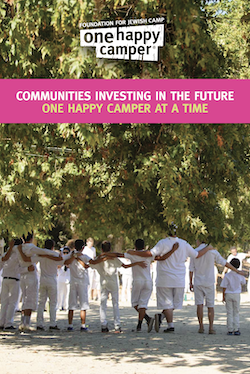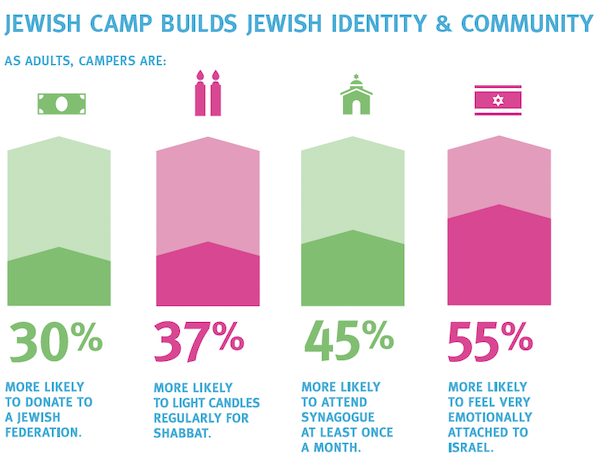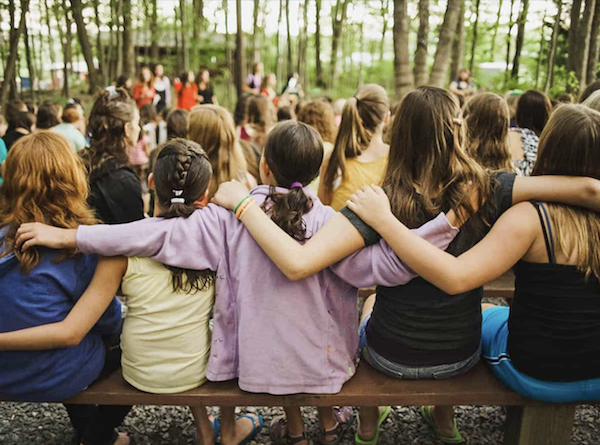The Foundation for Jewish Camp serves more than 155 Jewish summer camps, close to 80,000 campers and 11,000 counselors across North America every summer. Among its initiatives is the One Happy Camper program, which is run in partnership with Jewish federations – including in Montreal, Toronto and Calgary – foundations, PJ Library, and camps across North America. The program provides incentive grants of up to $1,000 to children attending nonprofit, Jewish overnight camp for the first time, with the intention of introducing more children to the magic of Jewish camp.
Based on the 2010 study by the FJC, Camp Works: The Long Term Impact of Jewish Overnight Camp, there is evidence that overnight Jewish camp is a proven means of building Jewish identity, community and leadership. As adults, campers are 30% more likely to donate to a Jewish federation, 37% more likely to light candles regularly on Shabbat, 45% more likely to attend synagogue at least once a month, and 55% more likely to feel emotionally attached to Israel. As well, one of three Jewish professionals (rabbis, cantors, teachers) started out as counselors at Jewish camp; one of five Jewish educators cited Jewish camp as a key experience that caused them to enter the field; and seven of 10 young Jewish leaders in their 20s and 30s attended Jewish summer camp.
North American Jewish overnight summer camps reach 77,000+ camp-aged children every summer, but this represents only 10% of eligible camp-age kids. In the FJC’s efforts to grow enrolment and increase awareness, FJC created the One Happy Camper program, thanks to the generosity of an anonymous donor. The program’s singular mission is to increase the number of children benefiting from the transformative experience of Jewish summer camp. Aimed at attracting new campers who do not have daily, immersive exposure to Judaism, the program provides financial incentives to encourage parents to choose nonprofit overnight Jewish summer camp over other summer options.
 Since the success of the 2006 pilot, the One Happy Camper program has expanded across North America. To date, 64,000 campers have experienced Jewish overnight camp as a result of FJC’s partnership with 40 community-based organizations (federations/foundations), four national camp movements, 30 individual camps, the Harold Grinspoon Foundation’s PJ Goes to Camp program and the Jim Joseph Foundation-funded JWest program.
Since the success of the 2006 pilot, the One Happy Camper program has expanded across North America. To date, 64,000 campers have experienced Jewish overnight camp as a result of FJC’s partnership with 40 community-based organizations (federations/foundations), four national camp movements, 30 individual camps, the Harold Grinspoon Foundation’s PJ Goes to Camp program and the Jim Joseph Foundation-funded JWest program.
Of One Happy Camper grant recipients, six out of 10 would have stayed home or attended a non-Jewish summer experience, and one out of three OHC recipients’ parents had not attended Jewish camp – FJC knows that parents who attended Jewish camp are more likely to send their own kids, so the grants are instilling a new legacy of Jewish camping for families.
Surveys show that OHC recipients enjoy their summers at camp as much as their peers, in that they say they found the experience of value and would likely recommend it. As well, they are as likely to return to camp. In fact, 82% of OHC recipients return to camp for a second summer. And their experience is infused with Jewish education, identity and connections: 97% feel that camps create an atmosphere where children are proud to be Jewish and 36% of recipients increased their participation in Jewish activities after their first summer at camp.
The majority of OHC families (63%) are not members or donors of their sponsoring organization but, as a result of the OHC grant, 78% of OHC parents feel more positive about their family’s connection to the Jewish community and 72% of OHC parents feel that they are more likely to support their sponsoring organization.
These are just some of the results found in the Foundation for Jewish Camp publication Communities Investing in the Future One Happy Camper at a Time. To read more, go to jewishcamp.org/community-partners and click on “Download ‘Communities Investing in the Future’ (PDF).”
– Courtesy Foundation for Jewish Camp



